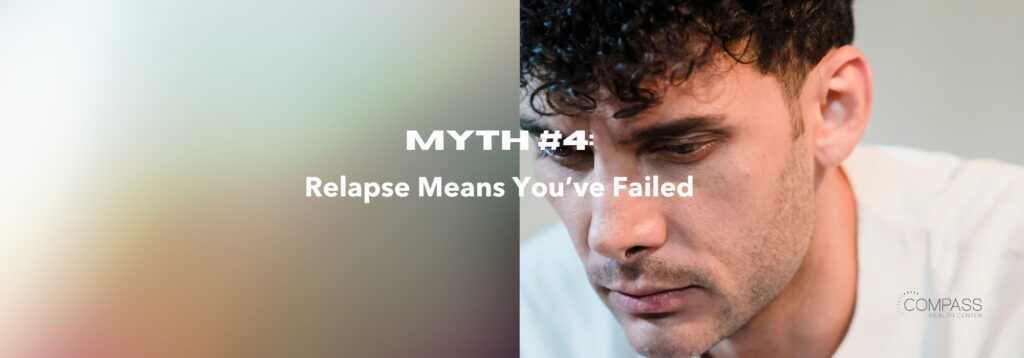
5 Myths About Mental Health and Substance Use Treatment — and What You Need to Know Instead
Misconceptions Hold People Back. Let’s Change That.
Stigma and outdated beliefs about substance use, addiction, and mental health continue to affect how people think about getting help. These myths don’t just misinform. They can delay treatment, reinforce shame, and prevent people from receiving care that meets their needs.
Compass Health Center offers compassionate, integrated care for mental health and substance use, designed to treat the whole person, not just the symptoms. Let’s separate fact from fiction so more people can take the first step toward support.

Myth #1: You Have to Hit ‘Rock Bottom’ Before Getting Help
Truth: The earlier you seek support, the better your outcomes.
The idea of needing to “hit rock bottom” before starting treatment is one of the most damaging myths around mental health and substance use. It implies hopelessness and it simply isn’t true.
Early access to substance use treatment and immediate mental health services can help people avoid crisis, gain tools to manage symptoms, and maintain their quality of life. There’s no need to wait for things to get worse.
At Compass Health Center, we provide same-day or next-day access to confidential assessments and admission into personalized treatment programs, meeting each person where they are with expert support from day one.

Myth #2: You Can’t Treat Mental Health and Substance Use Together
Truth: Integrated care leads to better results.
Mental health and substance use challenges are often deeply connected. Struggling with anxiety, depression, or trauma may increase the likelihood of using substances to cope. Substance use, in turn, can intensify mental health symptoms.
That’s why Compass offers an integrated care model designed to support individuals with co-occurring disorders.
Our programs offer trauma-informed care, psychiatry, family therapy, and evidence-based skills groups like CBT, DBT, and ACT, all under one roof.
Treating both mental health and substance use simultaneously helps patients understand how their experiences interact and equips them with the strategies to build long-term resilience.

Myth #3: Treatment Means Going Away for 30 Days
Truth: There are effective outpatient options that fit real life.
While inpatient care can be helpful for some, it’s not the only option. Our PHP and IOP programs offer structured, intensive care without requiring an overnight stay. Our flexible options offer treatment during the daytime, afternoon or evening to meet your scheduling needs.
These outpatient programs offer 3–5 hours of care per day, with in-person and virtual options, making it possible to continue work, school, or family life while receiving comprehensive support.
Group-based care also connects patients with others facing similar challenges, reminding us that healing happens in community, not isolation.

Myth #4: Relapse Means You’ve Failed
Truth: Setbacks are part of healing—not the end of it.
Recovery from mental health and substance use issues isn’t a straight line. Lapses and relapses may occur, and that doesn’t mean treatment didn’t work.
Relapse is often misunderstood through a lens of shame or lack of willpower. With an integrated care model, we reframe setbacks as learning opportunities. Our clinical team works with patients to adapt goals, build distress tolerance, manage urges, and develop new strategies for resilience.
There are many reasons people may relapse: emotional triggers, life transitions, even biological responses. What matters most is what happens next.
We help individuals re-engage in care with self-compassion and move forward with tools that align with their values and stage of life.

Myth #5: You Have to Choose Between Harm Reduction and Abstinence
Truth: Good care supports your goals—abstinence, moderation, or safer use.
Our approach to substance use treatment is collaborative, not prescriptive. We work alongside patients to explore the relationship between substance use and mental health, and we tailor goals to fit each individual’s needs and values.
Whether your path includes harm reduction, taper plans, or full abstinence, we provide the education and support to make informed choices.
Treatment doesn’t have to be all or nothing. It can be flexible, responsive, and built around what’s best for you, right now and as your needs evolve.
Ready for Real Support?
You don’t have to wait, hit bottom, or choose between narrow paths to get help.
Compass Health Center offers immediate access to mental health and substance use treatment, whether you’re seeking in-person care or virtual support.
With our integrated care model, we treat the full picture because healing happens when all parts of your experience are addressed, not just one.
Learn more about specialized substance use treatment that fits your life and supports your goals.


